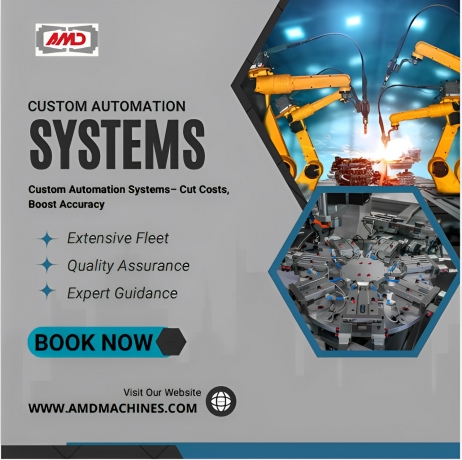The Shift Toward Smart Manufacturing
The use of automation, connectivity, and intelligent systems are driving huge changes in the manufacturing world. Custom automation solutions have become essential in this climate shift for businesses seeking to improve production, increase quality and protect a competitive advantage. Smart manufacturing is no longer a trend, it is a need. Custom Assembly Solutions, at their core, are designed to meet unique business objectives and workflow demands.
Why Custom Automation Systems Are the Future
Standard automation may provide fundamental benefits, but customised automation solutions are designed to meet the specific operations and goals of your manufacturing process. If you conduct high-mix, low volume activities or rapidly, high-volume manufacturing, personalisation guarantees its peak performance, reduced downtime, and maximum ROI.
Custom automation systems improve efficiency and consistency by integrating modern technologies such as robotics, sensors, data analytics, and machine learning. This personalised strategy solves individual production issues and builds a smarter, more agile manufacturing ecosystem.
Benefits of Custom Assembly Solutions
Custom Assembly Solutions offer the flexibility and precision that generic systems cannot match. These systems are designed to adapt to changing production requirements, allowing producers to scale efficiently and respond to market demands fast.
Some key advantages include:
- Improved throughput by streamlining assembly procedures.
- Reduced labour expenses through automation of repetitive processes.
- Improved product quality through constant processes.
- Increased operational safety through machine guarding and safety interlocks.
- Faster speed to market by reducing manual errors and delays.
Custom Assembly Solutions not only automates, but also optimises.
Tailored Automation for Every Industry
Each industry, from automotive and technology to medical devices and the aerospace industry, faces distinct constraints on manufacturing. Custom automation systems are designed with specific to an industry requirements in mind, ensuring adaptability, acceleration, and accuracy where they are most needed.
In the medical industry, for example, precision and compliance are essential. Custom Assembly Solutions ensure that all components meet the highest requirements. Automation systems in automotive production are designed to do high-speed, repetitive activities with minimal downtime, hence maximising efficiency.
Reducing Downtime and Boosting Efficiency
Maintenance is the enemy of profitability. Custom automation systems are designed to function with minimal disruptions. They can be equipped with predictive maintenance warnings, remote surveillance, and smart diagnostics, providing a prompt response to any system flaws and reducing lengthy outages.
In addition, because Custom Assembly Solutions are tailored to your particular equipment and product lines, they function easily with existing workflows. This compatibility enables speedier deployment, training, and less problems during implementation.
Integrating Digital Technologies
Smart manufacturing is far more than just automation; it is about the connectivity. Custom automation systems frequently incorporate Internet of Things (IoT) sensors, cloud-based analytics, and AI-powered knowledge to enable real-time decision-making. This information by data method enables enterprises to monitor manufacturing lines, forecast repairs, and optimise energy consumption.
Custom Assembly Solutions can be created with feedback loops, vision systems, and robotic accuracy to assist continuous improvement efforts. These capabilities allow manufacturers to fine-tune processes based on real performance information, rather than assumptions.
Custom Automation Systems and Workforce Transformation
A common misunderstandings is that automation damages jobs. In reality, specific solutions for automation help to revolutionise the workforce by eliminating repetitive, low-value jobs, freeing up personnel to focus on higher-level responsibilities like system monitoring, maintenance, and innovation.
Custom Assembly Solutions frequently demand collaboration between automation engineers and competent operators, resulting in a more technically adept and engaged workforce. This transition is critical in modern smart industries, where human-machine collaboration fosters more invention.
Cost Considerations and Long-Term ROI
Custom automation systems may need a larger initial investment than standard solutions, but frequently result in significant long-term savings. Reduced labour costs, decreased scrap rates, more availability, and better quality products all help to boost profitability.
Custom Assembly Solutions also provide scalability, allowing you to invest only what you need now with the flexibility to expand later. This adaptability means that your system develops with your company and responds to changing market conditions without requiring complete replacements.
Choosing the Right Partner for Smart Manufacturing
Not all automation partners are created equally. It is critical to collaborate with seasoned people that understand your business, operations, and growth goals. A good partner will evaluate your present workflow, discover inefficiencies, and create customised automation systems that solve real-world challenges.
Look for an automation vendor with a track record of producing Custom Assembly Solutions that are dependable, scalable, and backed by outstanding service. A properly executed system can lay the groundwork for years of efficient, intelligent output.
The Role of Customization in Industry 4.0
Industry 4.0 relies on smart factories, data interchange, and cyber-physical systems. At the centre of this change are highly specialised automation systems that provide accuracy, traceability, and adaptability. Instead of utilising generic tools for handling complicated workflows, manufacturers are investing in systems that are suited to their specific production environment.
Custom Assembly Solutions provide greater product variation while maintaining speed and quality, making them critical for businesses navigating the expectations of modern consumers and ever-changing markets.
Conclusion: Smarter Systems for Smarter Manufacturing
Smart manufacturing starts with investing in the right tools—and custom automation systems are among the smartest tools available. When paired with expertly designed Custom Assembly Solutions, they allow manufacturers to do more with less, adapt faster, and grow more sustainably.
From small production cells to fully integrated manufacturing lines, custom systems deliver unmatched precision, performance, and value. The future of manufacturing is not just automated—it's intelligent, adaptable, and customized to meet the challenges of tomorrow.






